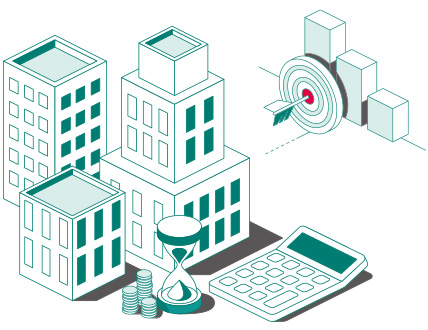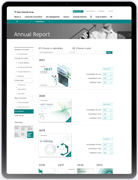BUSINESS REVIEW
Corporate Banking
As a partner devoted to the success of its corporate customers, Hana Financial Group strives to expand financial support for SMEs and to achieve sustainable growth together with them based on thorough and proactive risk management.

SME LOANS
-
Hana Bank continually increased financial support for SMEs in 2021 even in the face of growing uncertainties over rising global inflationary pressures threatening any chance of an economic recovery. At the same time, it managed the soundness of loan assets employing balanced growth strategies with a steady focus on asset quality. In support of the government’s SME policies, the Bank originated government-guaranteed loans for the development of regional economies and grew its asset portfolio balancing SME loans. Considering uncertainties over the economy, it implemented risk-oriented asset growth strategy focused on quality assets rather than competing with peers in loan growth. As a result, SME loan delinquency ratio stood at a sound 0.23% at the end of 2021, a 0.06%p improvement over the year, even though SME loans grew KRW 11.6 trillion YoY.
Hana Bank will stay focused on quality driven asset growth as risks associated with small-scale businesses continued to grow in tandem with rising prices reflecting global inflationary pressures and a persistent COVID-19 pandemic. In supplying financial support to SOHOs, it will primarily use loans backed by government-run guarantee institutions in line with government policy, while expanding loan products tailored to the characteristics of SOHOs through mobile channels. For SMEs, the Bank will continually develop loan products using various special sale promotions, offering diverse types of funding supports each customized to various customer needs. As implied in recent regulations limiting household loan growth, loans made to sound SMEs are essential.
Hana Bank’s annual growth target for 2022 in the corporate sector is KRW 7.0 trillion, which is KRW 1.0 trillion lower than the previous year’s target. The nominal decrease, however, will be more than compensated by the Bank’s steady focus on the quality of assets it will grow during the year. In addition, the Bank will actively move forward with SME-centered asset growth strategies while closely monitoring economic conditions. Along with the growth of quality assets, it will improve profitability by promoting cross-selling to corporate customers. ESG finance is another area we are making progress on. By adopting ESG evaluation and certification systems, an industry first, and implementing other relevant systems, Hana Bank will further increase ESG-related loans in 2022.
SOHO LOANS
-
In the area of SOHO loans, Hana Bank focused on digitalizing loan application and extension process, bolstering the line-up of new mobile products, and strengthening support services in 2021. First, the application process was fully digitalized for the “2nd Small Business Financial Support Program”, a pandemic-induced joint industry project, in the second half of 2021. The Bank’s mobile app was further upgraded to the extent that SOHO customers can now roll over their credit-based or asset-backed loans, a substantial improvement to the utility of the digital channel. In improving its mobile product line-up, the Bank launched two credit-based and one loan guarantee agency-backed loan products. The latter is the upgraded version of the Hana 1Q Credit Guarantee Foundation Loan launched in 2020, another industry first, with an extended nationwide coverage. The so-called one-click loan is guaranteed by the Korea Technology Finance Corporation forqualified SOHOs.
In strengthening consulting services for SOHOs, Hana Bank provided hands-on support to small businesses. By expanding the Bank’s local collaboration bases from 76 to 200 “Small Business Onsite Support Centers”, it supplied policy funds administered by various public institutions and provided diverse COVID-19 support programs developed for small businesses. Also, by opening a second “Small Business Dream Center”, it offered consulting services for potential startup founders as well as SOHOs having operational or/and financial difficulties. Three more such centers are scheduled to open, which will bring the total number to five by 2022. Once all five centers are up and running, Hana Bank will expand the “Hana SOHO Academy”, an online-only program, into an offline extension of all the centers offering a specialized education run by professional staffs and tailored to the specific business knowledge requirements of SOHO participants.
As a result, SOHO loans grew KRW 5.7 trillion or 11.3% YoY to KRW 56.2 trillion at the end of 2021. The number of SOHO borrowers also increased by 78,096 or 22.7% YoY to 421,072 in 2021, while the number of new customers remained about the same as the previous year, recording 112,215 persons in 2020 and 116,559 in 2021.
Following up on its first digitalization of SOHO loan application and extension process in 2021, Hana Bank will focus on next-tier digitalization by expanding the target group and scope of digital channel, such as digitally allowing third-party owners to provide collateral for loans. The Bank also plans to develop in close cooperation with loan guarantee institutions a process that will allow borrowers of loans backed by such institutions to fill out documents agreeing to loan extensions using only the Hana Bank app. Such a process is expected to increase customer convenience and enhance work efficiencies at the branch level as well as to attract more preferred SOHO customers.
Furthermore, the Bank will launch SOHO loan products based on a credit evaluation model developed for SOHOs. In contrast to existing credit-based products, whose loan limits are calculated based on its internal credit rating model, external credit ratings, as well as the transaction history of applicants, the new products in the pipeline will be provided based on alternative information that will enable an accurate assessment for the growth potential of applicants.
The Bank plans to increase the range of SOHOs that can apply for the “SOHO Loan 119”, a government support system, and establish additional support measures. It seeks to implement such systems as applying preferential interest rates to segments of social consideration (National Basic Livelihood Security Program recipients, the disabled, persons of national merit, persons aged 65 or more, multicultural families); reducing or exempting interest overdue on loans being readjusted (repayment of existing financial obligation); extending the installment repayment period for SOHO loans in arrears or subject to delinquency. In addition, it will use diverse online and offline methods to inform SOHO customers so that they receive adequate support in time.








